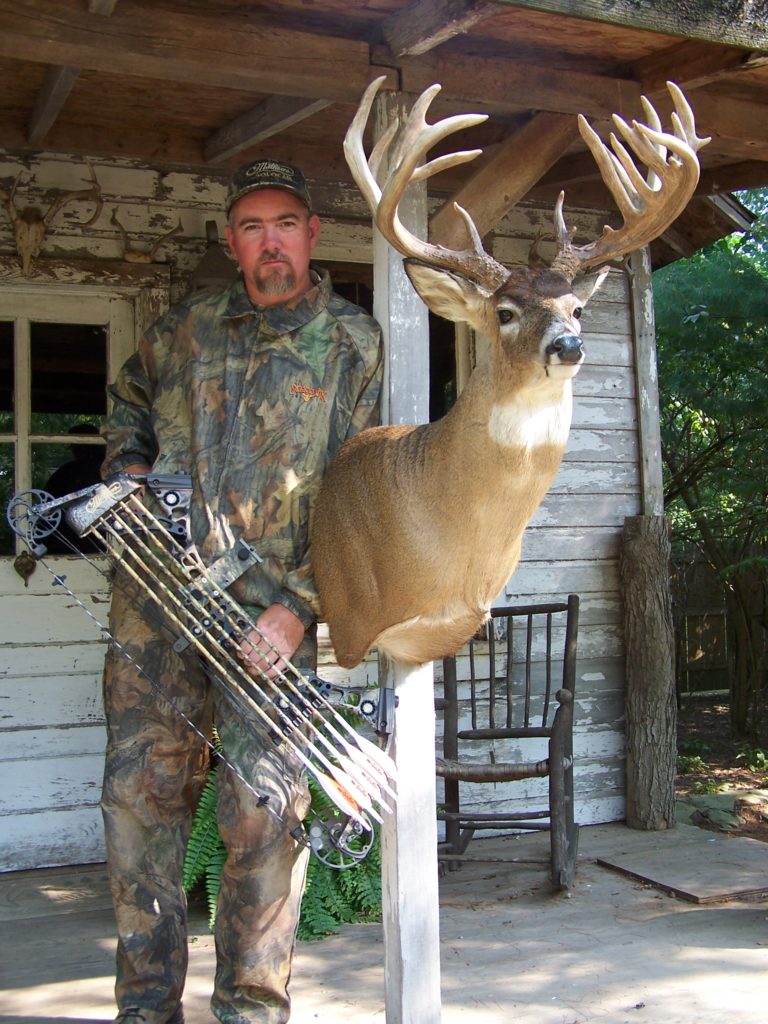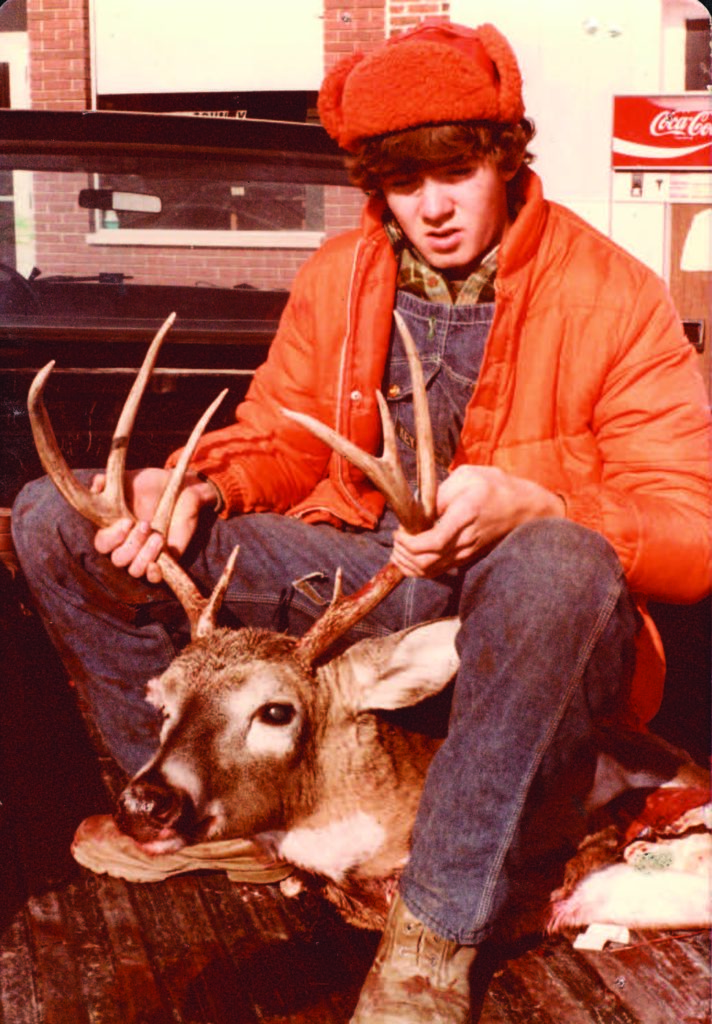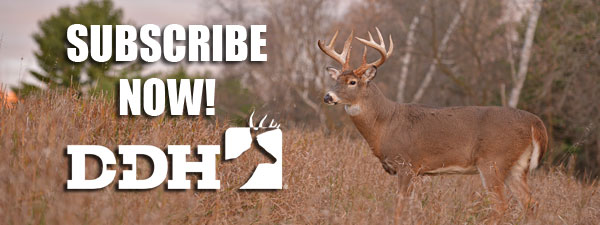D+DH In-Depth is our premium, comprehensive corner on America’s No. 1 game animal. In this graduate-level course, we’ll teach you about deer biology, behavior, and ultimately, how to become a better hunter. Want to be the first to get our premium content? Become a D+DH Insider for FREE!
The monster buck emerged from the thicket and stood just 40 yards from my stand watching the handful of does and fawns which fed under me. There wasn’t a blade of grass between me and the buck I had waited my whole life to see. There he stood, so close yet so far away. For many bowhunters, the 40-yard shot would not have caused a moments hesitation. That’s not the case with me however. You see, my self-imposed shooting limit is 30 yards and that doesn’t change with the size of the buck in front of me. I played the hand I was dealt and stood stone-still, hoping the does would feed past my stand and the giant buck would follow. It didn’t happen. Instead the does and fawns turned and fed back into the brush and the monster buck quickly followed.
As I sat down, my heart-rate returned to normal as I contemplated what had just happened. This was without a doubt the biggest buck I had ever seen from a stand. I am normally quick to size up a bucks rack and count points, but this one had me scratching my head. I thought he would score over 200 inches and had no idea how many points he had but it was “several.” Later I spent a sleepless night replaying the encounter in my mind. Was the buck really THAT big? Was I crazy for passing the open 40-yard shot? I convinced myself that the buck was definitely in the “huge” category and even though the encounter ended without an arrow being released, I had done the right thing by passing the shot.
The next day I returned to hunt a different stand on the same property. Within 20 minutes of settling in for the afternoon hunt I had a buck approach through the extremely thick cover and stop to work his rack through a grape-vine that was hanging from a tree only 20 yards away. It was the same buck! I couldn’t believe it. This was the biggest buck I had ever seen while hunting, and I saw him two days in a row from two different stands. As I looked him over, it was obvious that he was every bit as big as I had thought. He was also clearly close enough to shoot. The problem was that the cover was so thick that it would be a dicey proposition to thread an arrow through the maze of tree branches. I stood ready with my release snapped onto the string of my bow as I waited for the buck to give me the opportunity. It never happened. Instead he calmly walked away into the thick cover without ever knowing I was there or ever offering a clear shot to his vitals.
This may sound like a made up story, but I promise you it is true. While my strong hunting ethics kept me from releasing an arrow on those two hunts, my good judgment did pay off three weeks later when I killed this buck with a wide open 20-yard shot. He was indeed the buck of a lifetime, scoring 214 inches with a 20-point rack. This time the story ended well as I was later able to put my tag on this buck, however I can also relate other stories from my 30+ years of whitetail hunting where my strict ethical standards prevented me from taking the only shot I would ever get at some dandy bucks.

I better make it clear that this is not one of those articles where some outdoor writer tries to push his personal hunting ethics onto the reader. Instead I am going to convey to you the idea that you can and likely will become a better hunter by adhering to stricter ethical guidelines. Without question, the best hunters I have ever met have also been the most ethical. Strong hunting ethics forced them to become better hunters rather than looking for shortcuts to fill tags.
Ethics can best be described as the self-imposed limitations that one puts upon themselves. Ethics go beyond what the law allows. A good example is my refusal to take a shot beyond the distance of my personal limitation at the beginning of this article. While taking the shot would have certainly been legal, for me it was unethical. I certainly do not want to imply that it would be unethical for anyone else to take that shot. My archery shooting skills are not as good as many hunters and my yardage limitation reflects it. Each of us has to set our own limits. One problem I sometimes see however is that a person’s ethics change with the situation. For example, a hunter might have a self imposed shooting limit of 35 yards but when a big buck steps out and offers a 50-yard shot an arrow is released. The best hunters that I know hold steadfast to their ethics.
We should also be mindful that as hunters mature their hunting ethics change. My ethical guidelines are certainly different today than they were 25 years ago, and I suspect that 10 years from now they will be different than they are today. Ethics evolve and change with time, experience and maturity. We cannot expect beginning hunters to be adhering to the same principles that guide us veterans.
One thing that I have noticed is how much influence a mentor has on the ethical values that young hunters will develop and carry for life. I have seen numerous situations where a complete lack of any hunting ethics at all or even the blatant disregard of game laws is passed from generation to generation. If “Dad” thinks it is OK to shoot an extra deer and put someone else’s tag on it, then junior is most likely going to see nothing wrong with it either. When dealing with hunting ethics, the apple rarely falls far from the tree. Each year I get the opportunity to talk to a lot of young hunters as I work in booths at many major hunting shows. Most of the time I can get a good feel for the hunting ethics of a kid’s father just by listening to the youngster talk for a few minutes. I don’t even have to ask any questions, just listen to the youngster “tell his tales” and soon I know what dad is all about.
I was fortunate that my own father insisted that our hunting, and anything else we did, be done the right way. We didn’t look for ways to work around game laws, and we certainly didn’t break them. A lot of the credit for my later hunting success goes back to the foundation of good hunting ethics that my father instilled in me from the beginning. Instead of looking for shortcuts to harvested game, I learned to become a better hunter.

When I was in my late teens and began hunting more on my own than with Dad, I met a successful whitetail trophy hunter that reinforced my father’s approach to hunting ethics. Alan Foster was 10 years older than me and bridged the generation gap between my father and I. Al was an accomplished whitetail hunter and a regular writer for some major hunting magazines. When we first met, I just knew that Al would help me become a better hunter by sharing his “secrets.” I soon found out that his only secret was a deep passion for whitetails that went way beyond anyone else that I had met at that time. That deep passion combined with the strong ethics his own father had instilled in him drove him to be a successful whitetail hunter. To this day, Al Foster remains probably the most ethical hunter I have ever met. A good example of this was Al’s refusal to use hunting scents. He reasoned that scents took unfair advantage of a buck’s primary defense. In fact he compared it to a married man who had no intentions of cheating on his wife being strongly seduced by a Playboy centerfold model. Al didn’t want to “trick” a buck into making a mistake that cost him his life. Instead he wanted to take his bucks while they were naturally going about their business. Talk about taking hunting ethics to the extreme! I might add that Al has a wall full of giant whitetails that fell to his arrows. His strong ethics caused him to play the game with a stricter set of rules but also made him a better hunter.
I think most hunters start out with the “if it’s legal, it’s OK” approach. They will do anything within the law to increase their chances of filling their tag. In fact many never grow out of this stage. For others however, hunting is about the challenge more than about killing deer to fill tags. When filling tags becomes too easy, they start increasing the challenge. For example a hunter may have spent several years filling tags on deer drives until they no longer enjoyed it so they accepted the added challenge of hunting from stands or still-hunting. In other cases a hunter will give up hunting with guns to become strictly a bowhunter. Or maybe a hunter will start passing on younger bucks as he accepts the challenge of hunting older bucks.
Now don’t get the idea that I am saying that deer drives or hunting with guns or shooting young bucks is “unethical.” That’s not the case at all. These are simply examples of added challenges that we can each place on ourselves. These self-imposed challenges are what make up our own hunting ethics. To this day I still use hunting scents to some degree and yet my friend Al Foster does not look down on me for it or consider it unethical for me to do so. Each of us has a set of ethics that are as individual as we are. You alone must set your limitations concerning HOW you hunt. The law and what is legal should be the starting point, not the final answer.
With all of this said, there are some issues which though legal, are unethical. Shot selection immediately comes to mind. While shot selection is not covered by game laws, I think all of us can agree that taking shots through heavy cover, at extreme distances or at a bad angle is always unethical. There simply are no excuses and nothing screams “immaturity” more than someone relating the taking of a questionable shot whether the animal was cleanly harvested or not. We owe it to the game we pursue to only take ethical shots. No matter the ethical guidelines we set for ourselves, a clean humane kill should always be our goal.

My hunting career has been marked with a series of ethical progressions. Each time I mastered a particular phase, I increased the challenge. Each new step would often start out with a period where I did not fill my tags on a regular basis and many times I would end a hunting season without harvesting a single deer. In those situations I clung tight to the commitments I made until the last minute of legal shooting light on the last day of season. To me, wavering on a commitment is not an option. It was during those fruitless seasons that my hunting skills were honed the most because those seasons were when I spent the most time hunting. You cannot learn to become a better hunter if you are sitting at home with your tag already filled and you are limited as to what you can learn while scouting. Time spent in the woods actually practicing your trade is when skills are sharpened and taken to new levels.
Hunting ethics are never a one-size-fits-all proposition. Each of us has to satisfy our own desires and inner being. What is right for me won’t likely be right for you and vice versa. One thing is certain however: When you raise the challenge level you either become a better hunter or go home empty handed … maybe both. Just keep in mind, the best hunters are also the most ethical, bar none. The choices are yours.
Want to be the first to get our premium content? Become a D+DH Insider for FREE!


